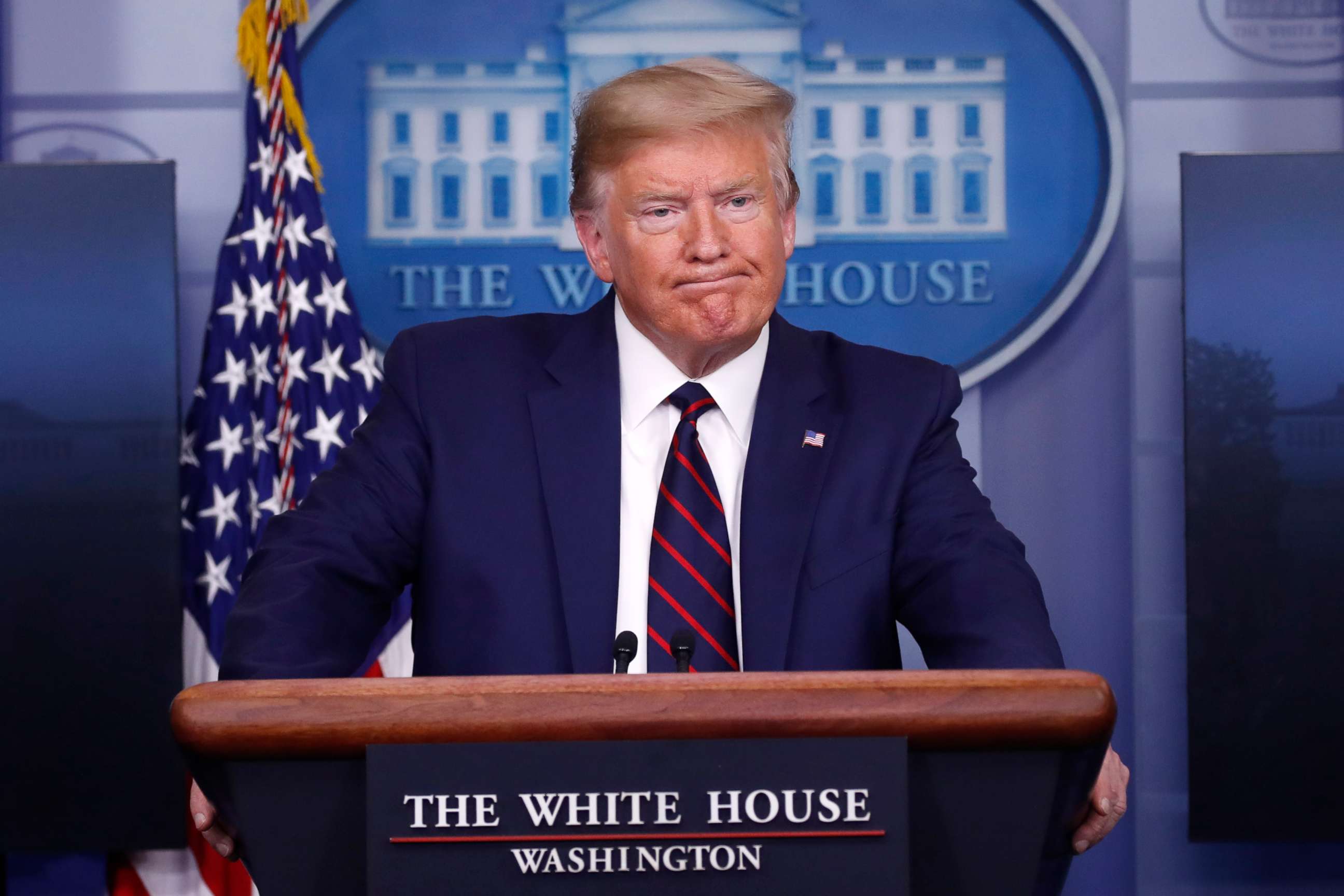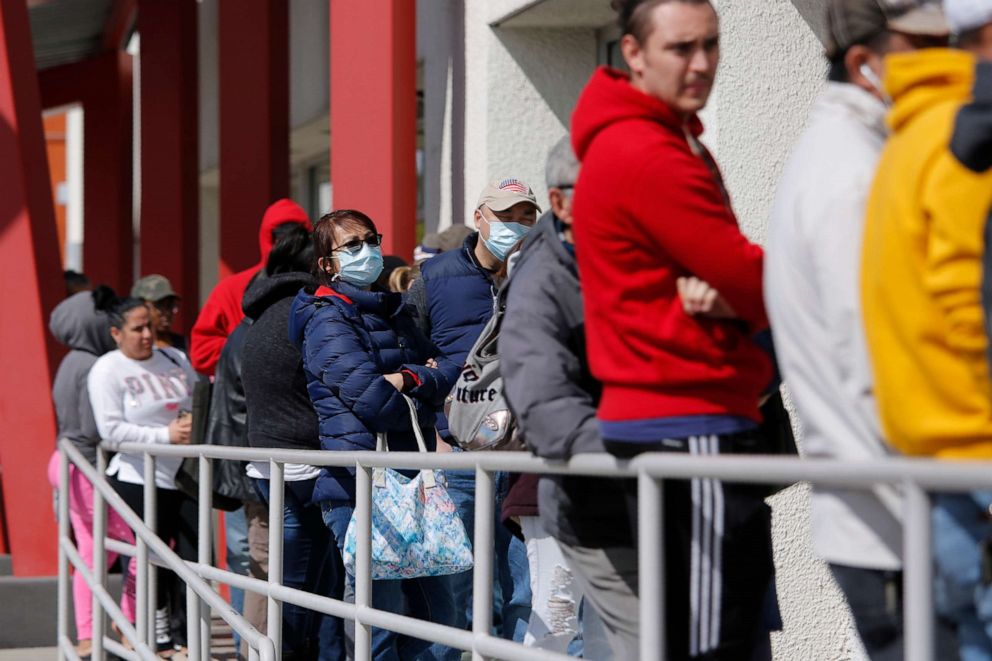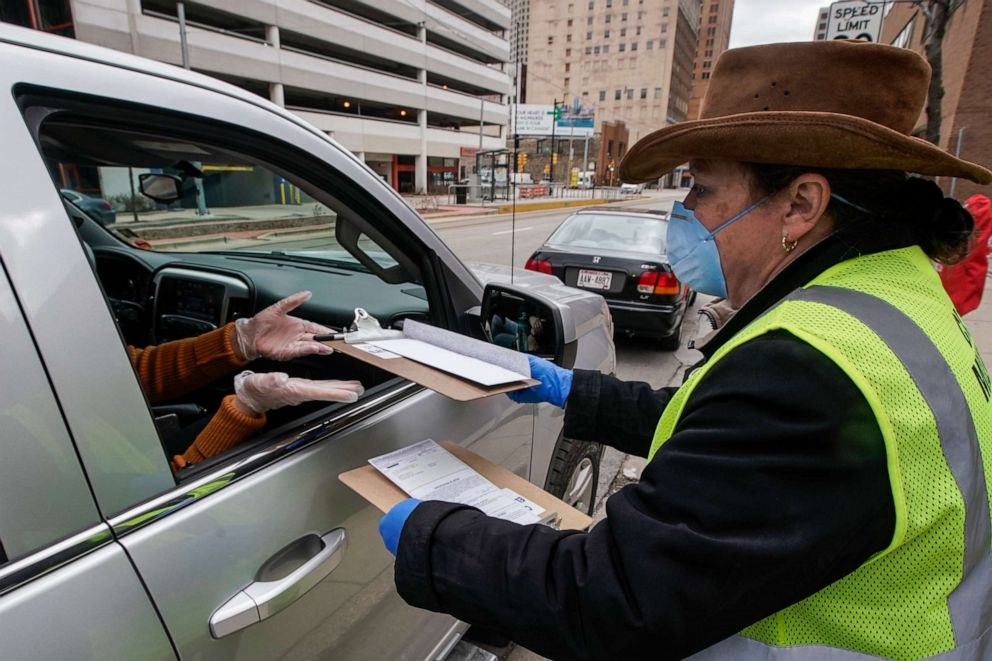The Note: Campaigns seek elusive political normalcy
This crisis has shaken the nation and blown up assumptions about this campaign.
The TAKE with Rick Klein
Campaign world is a bit like the rest of the world at the moment. Squint -- or tune out everything that's very out of the ordinary -- and things can almost look normal.
There's a primary in a key battleground state next week. The conventions are on for this summer -- though Democrats now have a new date.
Former Vice President Joe Biden's super PACs are on the air flaming President Donald Trump, and the president is now promising to respond in kind. Trump is warning about congressional "witch hunts," and is even warring with Jeff Sessions as the former attorney general tries to get his old Senate seat back.
There's even a return to a familiar pattern in polling. The ABC News/Ipsos Poll out Friday morning shows Trump's handling of the coronavirus crisis at 47% approval and 52% disapproval.

Voters look like they're back in their partisan corners, after a series of polls last week showed the president's approval rating nosing above water. There's even a partisan difference -- again -- on the level of concern over contracting COVID-19.
But that same poll also shows that barely half the country expects life to return to normal by the beginning of July -- three months from now. It's hard to imagine campaigning returning to anything like it's been any time before that.
"We're in control of our own fate," Trump said at the White House Thursday afternoon.
That's not clear at the moment, though. This crisis that has shaken the nation has blown up all assumptions about this campaign.
When politics does look somewhat normal, that's not based on any real knowledge of when or what campaigning will look like in the future. In peeking ahead to what's on the other side, that's a version of the politics of hope.
The RUNDOWN with MaryAlice Parks
For millions of Americans out of work as a result of the COVID-19 pandemic, the anxiety over losing their job is compounded by the fear of losing their health insurance benefits too at a time when they could need coverage most.
According to the Kaiser Family Foundation, last year approximately half of all Americans received health insurance through their employer, and in a new poll from the group -- out on Thursday -- half of all Americans said that during this global crisis they are worried they could lose their jobs, that they themselves or someone in their family will get sick, and that they won't be able to afford testing/treatment for the coronavirus.

Some Americans who have recently been laid off, might still be eligible for benefits through their unions or employers, depending on a number of factors. Others may be able to pay the full price of their current plan.
And, of course, options exist through those marketplaces set up via the Affordable Care Act, which sell plans for individuals and families. Those who had employer-based insurance and recently lost their jobs and insurance can enroll through a special enrollment provision.
Still, Trump decided not to reopen the enrollment period for everyone nationwide, which would have made it easier for others who may be without wages now to buy coverage and give those who opted not to get insurance a second chance to sign up. A dozen states and the District of Columbia instead so far have taken it upon themselves to open up enrollment again during this emergency.
A reminder too that many low-income Americans and those with disabilities, may qualify through Medicaid too.
The TIP with Meg Cunningham
While Wisconsin is still slated to move forward with its in-person voting next Tuesday, the Democratic National Committee announced Thursday that it would postpone its convention in Milwaukee until the week of Aug. 17.
Amid legal jockeying over the primary in the midst of the coronavirus pandemic, Sen. Bernie Sanders and Biden also had conflicting messages, with the Vermont senator calling for its postponement and Biden saying voters can maintain a reasonable distance from each other, unlike a convention with thousands of people in one arena.

Meanwhile, the Trump campaign took aim at Biden, saying that the Democratic front-runner "wants the people of Wisconsin to risk their lives because he’s so desperate to be the nominee."
ONE MORE THING
Fewer than half of Americans believe their regular daily routine will return to normal by June 1 amid sharply rising concerns over contracting the novel coronavirus according to a new ABC News/Ipsos poll released Friday.
THE PLAYLIST
ABC News' "Start Here" podcast. Friday morning's episode features ABC News Chief Business and Economics correspondent Rebecca Jarvis, who helps break down the record unemployment numbers and what comes next. ABC News Senior Congressional correspondent Mary Bruce tells us if a new stimulus package is on the way and what happens for those who lose their health care coverage during the pandemic. And, ABC News Senior Investigative reporter Aaron Katersky tells us why the New York Police Department is concerned about domestic violence incidents while Americans are in quarantine. http://apple.co/2HPocUL
Five Thirty Eight Politics Podcast. At FiveThirtyEight, we spend a lot of time modeling outcomes of elections and sporting events. But, as you might have guessed, modeling the course of a novel pandemic is very different. There are so many variables and such little historical data to work with. In this installment of the FiveThirtyEight Politics podcast, senior science writer Maggie Koerth and quantitative editor Laura Bronner explain how much we don't know about the COVID-19 virus. They also discuss how epidemiologists are trying to overcome those challenges in order to lessen the uncertainty about the toll the pandemic might take. https://53eig.ht/2Jb12X2
WHAT YOU NEED TO KNOW THIS WEEKEND
Download the ABC News app and select "The Note" as an item of interest to receive the day's sharpest political analysis every weekday.
The Note is a daily ABC News feature that highlights the key political moments of the day ahead. Please check back Monday for the latest.




